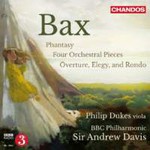
Four Orchestral Pieces / Phantasy / etc
 $35.00
Out of Stock
$35.00
Out of Stock6+ weeks add to cart
ARNOLD BAX
Four Orchestral Pieces / Phantasy / etc
Philip Dukes (viola) / BBC Philharmonic, Sir Andrew Davis
[ Chandos / CD ]
Release Date: Wednesday 20 August 2014
This item is currently out of stock. It may take 6 or more weeks to obtain from when you place your order as this is a specialist product.
Sir Andrew Davis is among the most distinguished interpreters of British music today and here turns to the works of Sir Arnold Bax. With the inclusion of the Phantasy for Viola and Orchestra, this disc marks the completion of Chandos's long project to record Bax's complete orchestral music over time.
Born in 1883 into a wealthy family in London, Arnold Bax began a love affair with Ireland as a young man. He moved there in 1911 and his Four Orchestral Pieces from 1912 - 13 are deeply influenced by the landscape of the countryside near his Dublin home. The first three are better known in revised versions, from 1928, as Three Pieces for Small Orchestra. Here 'The Dance of Wild Irravel' joins the other three movements for the premiere recording of the four Pieces as Bax originally conceived and orchestrated them.
The Phantasy for Viola and Orchestra from 1920 was inspired by the strong feelings with which Bax responded to the Irish political turmoil at the time, underlined by his use of the Sinn Fein Marching Song (later the Irish national anthem) at its climax. Bax is celebrated for his melodic invention and this passionately lyrical score must be one of the finest examples of his gift. Here the soloist is Philip Dukes, described by The Times as 'Great Britain's most outstanding viola player'.
By 1927 Bax's style was changing and the opening of the Overture, Elegy and Rondo is reminiscent of a classical concerto, suggesting a leaning towards then-fashionable neoclassicism. The long, dreamy melody of the middle section and brilliant, colourful orchestration, however, are unmistakable hallmarks of Bax's individual voice.
"All three of these rarely heard works come from the first half of Bax's career as a composer. The earliest is the lightweight but charming set of Four Orchestral Pieces from 1914, recorded here for the first time, and also known as the Four Orchestral Sketches or the Four Irish Pieces - all three names are used on the manuscript. The latest is the far more substantial Overture, Elegy and Rondo, which was completed in 1927. Though stylistically the two works have their differences - the wispy French influences on the four pieces, especially Ravel, were replaced by a more muscular, clearer-cut style by the mid-1920s - both works reveal the same sure-footed handling of the orchestra, which these carefully manicured performances under conductor Andrew Davis show off beautifully. Between them comes the Phantasy for Viola and Orchestra of 1920, composed for the virtuoso Lionel Tertis, and Bax's reaction to the political turmoil in Ireland at the time, moving from lament to triumph and quoting the Sinn Fein marching song at its climax. Not a major work, but a very interesting one, as the soloist, Philip Dukes, makes the most of what he's given." (Guardian)
"there's little with which to quibble performance-wise...Drawing some first-rate playing from the BBC Phiharmonic, Davis imparts plenty of confident swagger and twinkling fun to both outer movements...every Baxian will surely want to investigate this new Chandos survey." (Gramophone)
"Dukes deliver the Phantasy's solo part with a forthright energy that seems to thwart loveliness of tone. In every other department these performances could hardly be finer. The orchestral playing is vivid and precise, as is the recorded sound; and Davis's conducting is a masterclass in how to conjure atmosphere." (BBC Music)
"Dukes is a sterling advocate of this unjustly neglected work - the haunting cor anglais solo recalls the shepherd's lament in Wagner's Tristan - while Davis proves passionate in the impressionistic Four Orchestral Pieces and the powerful, dark Overture, Elegy and Rondo." (Sunday Times 14th September 2014)
Tracks:
Orchestral Pieces (4)
Phantasy for Viola and Orchestra in D minor
Overture, Elegy & Rondo